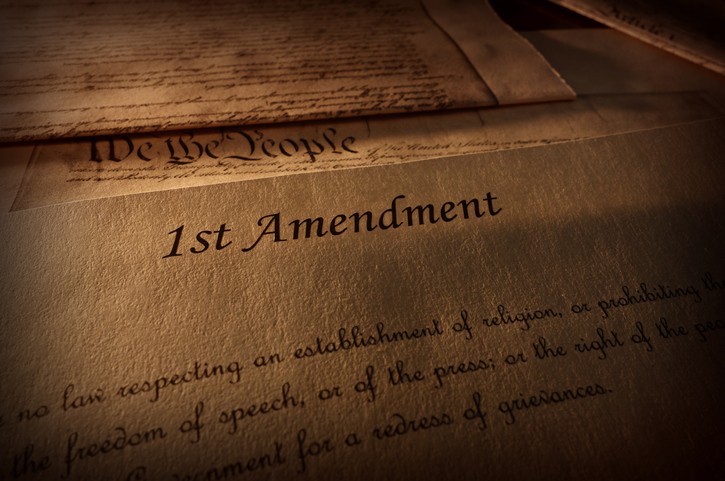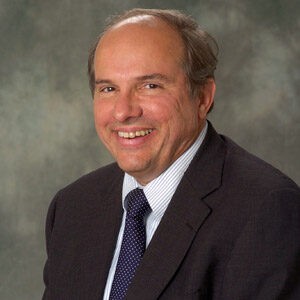March 8, 2023
Well-heeled Win: Today’s First Amendment Disputes
Professor at the Southern Illinois University School of Journalism

This column is the third in an ACS special series examining the First Amendment Freedom of Speech and its role in the development and evaluation of public policies regarding the regulation of the internet, campaign finance, antidiscrimination laws, and other areas.
This is an abridged version of a piece originally published in Gateway Journalism Review.
Today’s conservative Roberts Court is a bastion of First Amendment freedom as was the liberal Warren Court half a century ago. But the winners are different. Establishment insiders win today whereas outsiders won most often during the Warren years.
On its 200th birthday in 1991, the First Amendment had developed into a powerful shield against government abuse of outsiders, leftists, anarchists, communists, labor unions, Jehovah’s Witnesses, atheists and non-Christians. It protected the press from government censorship and debilitating libel suits. It protected leftist flag burners and a dissident wearing a “Fuck the draft” jacket into a courthouse. And it protected little Mary Beth Tinker wearing an armband to school protesting the Vietnam War.
By its 231st birthday this month, the First Amendment winners are increasingly well-heeled. Corporations won the right to spend an unlimited amount of corporate money – millions, billions – to help their favored candidate win an election. Hobby Lobby won a decision based on religious liberty allowing it to refuse to provide contraceptive health coverage for its female workers. Conservative policy groups won a decision in an Illinois case blocking government unions from imposing mandatory union fees on non-members. And the court has lent a sympathetic ear to bakers and florists who say they won’t serve same-sex couples whose marriages violated their religious beliefs.
Beyond that, gun owners won greatly expanded rights under a Roberts Court’s reinterpretation of the Second Amendment. Corporations won decisions to force consumers and former employees into arbitration instead of class actions. Human rights lawyers lost their right to counsel foreign clients connected to terrorism about nonviolent conflict resolution. Polluters won a major victory cutting back on the government’s power to address global warming. And the court just took up a case that could impair the right to strike by subjecting unions to state lawsuits.
Gregory P. Magarian, the Thomas and Karole Greene Professor of Law at Washington University and a former Supreme Court clerk, puts it this way: “The court has put much more energy into expanding the free speech rights of politically or economically powerful speakers, while largely disdaining the First Amendment concerns of politically and economically disempowered speakers.”
Justice Samuel Alito is a leader of the shift. Mark Sableman, a St. Louis media lawyer at Thompson Coburn, pointed out, in a recent speech on the Supreme Court. Alito wrote the 2017 decision throwing out a federal law that banned disparaging trademarks that were offensive. Alito wrote, “Speech may not be banned on the ground that it expresses ideas that offend.” The ruling helped the Washington Redskins at the time in its effort to hold on to the Redskins name.
Alito also wrote the Hobby Lobby decision protecting corporate religious scruples. In addition, his replacement of Sandra Day O’Connor led to Citizens United opening the door to unlimited corporate political spending and to broader Second Amendment gun rights.
Magarian remarks, “Justice Alito is passionately committed to protecting rights and interests of people exactly like Justice Alito.”
Chaos in the Information Universe
Meanwhile, the Bill of Rights is at the vortex of a hurricane of chaotic supercharged speech. Just about everybody thinks the other guy is taking away their free speech rights.
Conservatives complain about a Woke culture, today’s version of political correctness, where conservative speakers are disinvited from college campuses by so-called “cancel culture.” Liberals complain that broadcast and Internet sites promote white supremacy, hate, misogyny and attacks on transgender people.
Sen. Josh Hawley, R-Mo., accuses social media companies, such as Twitter, of taking orders from the government to take down false information about COVID-19 and vaccinations. Liberals respond that the MAGA universe threatens public health and the health of democracy by spreading lies about COVID-19, vaccinations and who won the 2020 election.
Gov. Ron DeSantis, mentioned as a presidential candidate, boasts Florida is where “woke goes to die,” and passed the so-called “Don’t say gay” bill, limiting what public school teachers can say about gender issues in school. At the same time, Pen America reports from July 2001 to June 2002 there were 2,532 instances of individual books being banned, affecting 1,648 unique book titles. In Missouri, Secretary of State Jay Ashcroft, a possible gubernatorial candidate, is seeking to cut off money from public libraries that offer books that might appeal of some sexual preferences of minors.
At a recent court hearing, DeSantis’ lawyer was asked what woke means. He responded: “it would be the belief there are systemic injustices in American society and the need to address them.”
At the center of the storm is today’s media, which bear only a passing resemblance to the media of 2000.
Think of the communications platforms and technologies that didn’t exist 20 years ago, or were in their infancy.
Artificial intelligence. ChatGPT. Virtual reality. Facial recognition software. TikTok, Instagram, Facebook, Google, SnapChat, NewsMax, Breitbart, One America News, Huffington Post, tweets, GPS, citizen journalists, aggregators, page views, click bait, impressions, shares, comments, friends, likes, deep fakes, the filter bubble, podcasts, Google Earth, Google Street Views, WikiLeaks, the Intercept, Politico and on and on.
The Internet enthusiasts of 2000 predicted a blossoming of democracy with millions of new voices suddenly having the equivalent of a printing press in their hand-held smart-phone. But instead, we ended up in a dense fog of information and disinformation that can cause citizens to get lost. The legacy press, after a golden age of uncovering Watergate and the Pentagon Papers, steamed right into the unseen iceberg of new technology and began taking on water.
The press is having a nervous breakdown.
Hackers and spies manipulate digital information. Hackers in St. Petersburg, working for Russian intelligence, pulled incriminating information from the Democratic Party’s digital files and leaked it – apparently via WikiLeaks – to the U.S. press to influence the 2016 election.
Then, a month before the 2020 election, powerful social media platforms used the technology usually reserved to block distribution of child porn to block distribution of a New York Post story on Hunter Biden’s laptop. Twitter’s Jack Dorsey apologized, but after the fact.
If the media universe wasn’t chaotic enough, Elon Musk has bought Twitter and, as the chief “twit,” immediately began writing a series of false and misleading posts. One relayed false allegations about the attack on Nancy Pelosi’s husband. Another suggested his recently departed safety chief, Yoel Roth, was “in favor of children being able to access adult Internet service.” A third called for the firing of Dr. Anthony Fauci and his criminal prosecution for supporting research that killed millions. Musk tweeted: “My pronouns are Prosecute/ Fauci.”
Missouri’s Sen. Hawley leads the charge against social media companies, complaining that it is a violation of the First Amendment for Twitter or other social media companies to consult with the government about posts containing false information about COVID-19 and vaccines. Hawley maintains this consultation makes the private social media giants “arms” of the government and White House and therefore violates the First Amendment.
Legal experts point out that the First Amendment applies to government censorship of speech, not editorial decisions by private media companies. The First Amendment would only be implicated if the government were to strongarm a private media company into blocking a speaker.
Hawley also has introduced a bill to remove trademark protections from Disney Corp. for having criticized Gov. DeSantis’ so-called “Don’t say Gay” bill. He took this action as DeSantis moved to remove special tax advantages that Disney had enjoyed for its theme park.
Magarian, the Washington University First Amendment expert, says this may violate Disney’s free speech rights. “Corporations certainly are capable of expressing themselves, as Disney did when it spoke out against ‘Don’t Say Gay.’ Government, in turn, may not retaliate against any speaker’s political speech,” he said.
Jonathan Turley, a libertarian law professor at George Washington University and adviser to Fox News, testified recently that, “The calls for greater governmental and private censorship in the United States are growing at a time when free speech is under unprecedented attack. Such movements remain a type of dormant virus in our body politic.”
Turley is most concerned about college campuses canceling invitations to conservative speakers. “The extensive ‘canceling of speeches and events on campuses often involves rejecting the classical view that free speech protects all speakers, even those who are viewed as advancing harmful ideas.”
Charter to Say No
Loud chaos may be exactly what we should expect from the Bill of Rights. It is every American’s charter to say no.
“The Bill of Rights is a born rebel,” wrote Frank I. Cobb, a 20th century news reporter. “It reeks with sedition. In every clause it shakes its fist in the face of constituted authority…It is the one guarantee of human freedom to the American people.”
Magarian expressed a similar sentiment in the introduction to his book, Managed Speech: “If a democracy doesn’t make noise, it dies. We in the United States are supposed to be a self-governing people. . . Selfgovernment requires constant political debate. . . Those discourses can’t just comprise polite expressions of mutual affirmation by wealthy and powerful elites. The discussion we need is boisterous, angry, and hopeful. It’s aspirational, transgressive, and inclusive.
“It’s the steady hum of ideas in laboratories and studios, in chat rooms and comment threads, and most of all in the streets. It’s the shouts that forge social movements that shape our society, from revolutionary battle cries to abolitionist prophecies, from labor pickets to civil rights sit-ins, from blessings of same-sex marriages to whatever our shared future holds. . .
“It’s the exclamations, whispers, and laughter that make us the individuals we are, individuals who join together, govern ourselves. . . A democratic society needs to muster and sustain the broadest, deepest, noisiest public discussion we can all pull from our lungs.”
_______________________
 William H. Freivogel is a professor at the Southern Illinois University School of Journalism, a contributor to St. Louis Public Radio and publisher of the Gateway Journalism Review.
William H. Freivogel is a professor at the Southern Illinois University School of Journalism, a contributor to St. Louis Public Radio and publisher of the Gateway Journalism Review.




